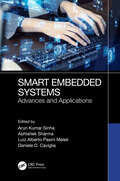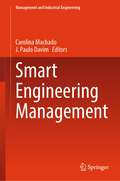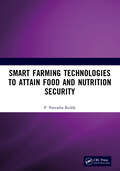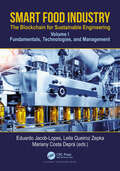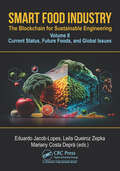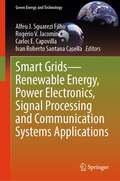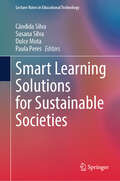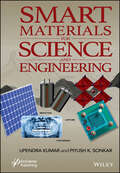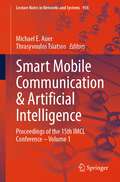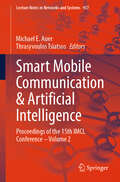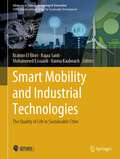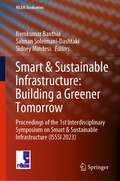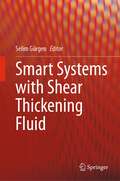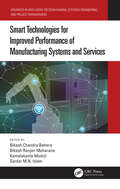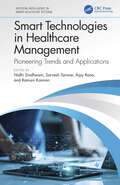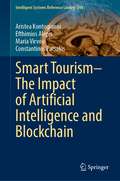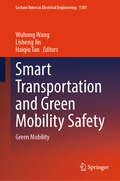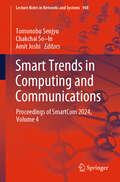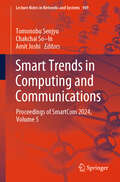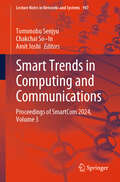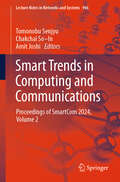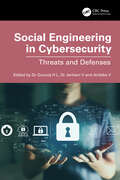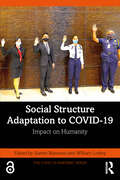- Table View
- List View
Smart Embedded Systems: Advances and Applications
by Arun Kumar Sinha Abhishek Sharma Luiz Alberto Pasini Melek Daniele D. Caviglia"Smart Embedded Systems: Advances and Applications" is a comprehensive guide that demystifies the complex world of embedded technology. The book journeys through a wide range of topics from healthcare to energy management, autonomous robotics, and wireless communication, showcasing the transformative potential of intelligent embedded systems in these fields. This concise volume introduces readers to innovative techniques and their practical applications, offers a comparative analysis of wireless protocols, and provides efficient resource allocation strategies in IoT-based ecosystems. With real-world examples and in-depth case studies, it serves as an invaluable resource for students and professionals seeking to harness the power of embedded technology to shape our digital future. Salient Features: 1. The book provides a comprehensive coverage of various aspects of smart embedded systems, exploring their design, implementation, optimization, and a range of applications. This is further enhanced by in-depth discussions on hardware and software optimizations aimed at improving overall system performance. 2. A detailed examination of machine learning techniques specifically tailored for data analysis and prediction within embedded systems. This complements the exploration of cutting-edge research on the use of AI to enhance wireless communications. 3. Real-world applications of these technologies are extensively discussed, with a focus on areas such as seizure detection, noise reduction, health monitoring, diabetic care, autonomous vehicles, and communication systems. This includes a deep-dive into different wireless protocols utilized for data transfer in IoT systems. 4. This book highlights key IoT technologies and their myriad applications, extending from environmental data collection to health monitoring. This is underscored by case studies on the integration of AI and IoT in healthcare, spanning topics from anomaly detection to informed clinical decision-making. Also featured is a detailed evaluation and comparison of different system implementations and methodologies. This book is an essential read for anyone interested in the field of embedded systems. Whether you're a student looking to broaden your knowledge base, researchers looking in-depth insights, or professionals planning to use this cutting-edge technology in real-world applications, this book offers a thorough grounding in the subject.
Smart Engineering Management (Management and Industrial Engineering)
by Carolina Machado J. Paulo DavimThis book explores smart/intelligent business and management, addressing the challenges and issues encountered by contemporary organizations. It provides a detailed and up-to-date perspective on theoretical and practical aspects related to the management of dynamic, competitive, and socially responsible organizations. The topics covered span the strategic integration of smart technologies to enhance competitiveness, the intersection of artificial intelligence, hyper-personalization, and customer-centricity, the transformative impact of Industry 4.0 technologies in manufacturing, agile human resource management, eco-innovation practices, and the effective management of a multigenerational workforce. The book also examines the strategic interplay between talent management and smart organizations, making it an essential guide for navigating the intersection of technology, strategy, and human capital in the contemporary business landscape.
Smart Farming Technologies to Attain Food and Nutrition Security
by P. Parvatha ReddyThe concept of Rainbow Revolution is an integrated development of crop cultivation, horticulture, forestry, fishery, poultry, animal husbandry, and food processing industry. The concept of Smart Farming Technologies in agriculture is a step towards sustainability. India has already achieved resilience in agriculture, including the horticultural sector, through effective agricultural technology generation and is now on the threshold of a “rainbow revolution” that will ensure both household nutrition security and prosperity for its people. This book will be of immense value to the scientific community involved in teaching, research and extension activities related to strategies for achieving Rainbow Revolution for enhancing farmers’ income, food, and nutrition security. The book can also serve as a very useful reference for policymakers and practicing farmers.
Smart Food Industry: Fundamentals, Technologies, and Management, Volume 1
by Eduardo Jacob-Lopes Leila Queiroz Zepka Mariany Costa DepráSmart Food Industry: The Blockchain for Sustainable Engineering, Volume I - Fundamentals, Technologies, and Management is a comprehensive overview of the current state of knowledge about food engineering and processing, under sustainable engineering perspective. This book includes disruptive approaches that will potentially enable the food industry for the transition to sustainable production. Divided into four parts, the book explores (i) fundamentals of sustainable food, (ii) conventional technologies in the food industry, (iii) sustainabile emerging technologies in food industries, and (iv) sustainable management in food industries. The book is an invaluable reference resource for students, researchers, graduates, and professionals, in general, who wish to gain knowledge in the engineering and food processing area as well as about sustainable food industry practices.
Smart Food Industry: Volume II - Current Status, Future Foods, and Global Issues
by Eduardo Jacob-Lopes Leila Queiroz Zepka Mariany Costa DepráSmart Food Industry: The Blockchain for Sustainable Engineering, Volume II - Current Status, Future Foods, and Global Issues reviews the literature and scientific frameworks to present a kind of sustainability compass. Disruptive approaches around potential sustainable foods are also widely investigated in order to be an alternative route for the industrial future. Thus, this book proposes new concepts and strategies to face future sustainability challenges that are on the horizon and can impact the next generation of foods.Divided into three parts, this book discusses the (i) status of sustainable food industry, (ii) next generation and future technology for sustainable foods, and (iii) policy, social, economic, and environmental aspects in food industries.Given the book's breadth, it provides readers with an invaluable reference resource for students, researchers, graduates, and professionals, in general, who wish to gain knowledge about the engineering and food processing area so as to achieve sustainable food production.
Smart Grids—Renewable Energy, Power Electronics, Signal Processing and Communication Systems Applications (Green Energy and Technology)
by Alfeu J. Sguarezi Filho Rogério V. Jacomini Carlos E. Capovilla Ivan Roberto Santana CasellaThis book discusses power electronics, signal processing and communication systems applications in smart grids (SG). Smart grids can be considered an evolution of the classic energy model to allow a more efficient management of the relationship between supply and demand, in order to overcome the contingency problems of the modern world. To achieve their goals, they use advanced technologies of information and communication, power electronics and signal processing, and can be used to integrate renewable energy sources.The book is divided into two main parts. The first part presents the application of power electronics technologies in renewable energy systems, while the second part presents some telecommunications, signal processing and energy capture technologies within the context of SGs. The chapters are written by invited expert authors, according to their research areas.
Smart Learning Solutions for Sustainable Societies (Lecture Notes in Educational Technology)
by Cândida Silva Susana Silva Dulce Mota Paula PeresThis book showcases research and project results on technology, smart learning, and sustainability education and analyzes smart learning solutions for lifelong learning. It discusses their impact and potential for transfer and scaling and reviews how real solutions perform in the real world. Sustainable societies are built on twenty-first-century skills. Attaining the United Nations' Sustainable Development Goals requires a focus on a new set of knowledge, skills, and attitudes, as well as novel and smart strategies that leverage state-of-the-art technologies and make these skillsets widely available in our societies to all groups of people, at any time in their lives, in professional as well as academic settings. This book serves as a helpful resource for researchers, academics, practitioners, and consultants from around the world who are involved in the study, management and development of educational technology, smart learning, sustainability education, and related issues.
Smart Manufacturing Factory: Artificial-Intelligence-Driven Customized Manufacturing
by Jiafu Wan Baotong Chen Shiyong WangArtificial Intelligence (AI) technologies enable manufacturing systems to sense the environment, adapt to external needs, and extract process knowledge, including business models such as intelligent production, networked collaboration, and extended service models. This book therefore focuses on the implementation of AI in customized manufacturing (CM). The main topics include edge intelligence in manufacturing, heterogeneous networks, intelligent fault diagnosis and maintenance, dynamic resource scheduling in manufacturing, and the construction mode of the smart factory. Based on the insights of CM and AI, the authors demonstrate the implementation of AI in the smart factory for CM, including architecture, information fusion, data analysis, dynamic scheduling, flexible production line construction, and smart manufacturing services. This book will provide important research content for scholars in artificial intelligence, smart manufacturing, machine learning, multi-agent systems, and industrial Internet of Things.
Smart Materials for Science and Engineering
by Upendra Kumar Piyush Kumar SonkarSMART MATERIALS FOR SCIENCE AND ENGINEERING Smart materials, also known as advanced or creative materials, are described as advanced materials that react intuitively to environmental changes or as materials that can return to their original shape in response to certain stimuli. Smart materials are classified as either active or passive based on their characteristics. There are two types of active materials. The first kind cannot change its characteristics when subjected to outside stimuli, for example photochromatic spectacles that only alter their color when exposed to sunlight. The other, which includes piezoelectric materials, can change one sort of energy (thermal, electrical, chemical, mechanical, or optical) into another. When subjected to external pressure, it can generate an electric charge. As an example, optical fibers can transmit electromagnetic waves. In contrast, passive smart materials can transmit a specific sort of energy. They have some amazing qualities that set them apart from other materials, such as transiency, meaning they can react to different kinds of external stimuli immediately, self-actuation or the capacity to change their appearance and shape, selectivity where the response is divided and expected, directness when the response is limited to the activating event, shape-changing where the material can change its shape to external stimuli, their ability to determine their own health, also known as self-diagnosis, and their ability to self-heal. The ability to synthesize novel materials has substantially progressed thanks to science and technology over the past 20 years. They fall mostly into the following four categories: polymers, ceramics, metals, and smart materials. Among these, smart materials are gaining popularity since they have more uses than conventional materials. Smart materials are unusual substances that have the ability to alter their properties, such as those that can immediately change their phase when placed near a magnet or their shape simply by applying heat. Humanity will be significantly impacted by this new era of smart materials. For instance, some of them can adapt their properties to the environment, some have sensory capabilities, some can repair themselves automatically, and some can degrade themselves. These extraordinary properties of smart materials will have an effect on all facets of civilization. There are many different types of intelligent materials, including magnetorheological materials, electro-rheostat materials, shape memory alloys, piezoelectric materials, and more. This book describes many forms of smart materials and their possible uses in various fields. A literature survey discusses the different types of smart materials, such as based ceramics, polymers, and organic compounds and their needs, advantages, disadvantages, and applications will be comprehensively discussed. A discussion of well-established smart materials including piezoelectric, magnetostrictive, shape memory alloy, electro-rheological fluid, and magnetorheological fluid materials will be discussed with their present prospects.
Smart Mobile Communication & Artificial Intelligence: Proceedings of the 15th IMCL Conference – Volume 1 (Lecture Notes in Networks and Systems #936)
by Michael E. Auer Thrasyvoulos TsiatsosInteractive mobile technologies are today the core of many—if not all—fields of society. Not only the younger generation of students expects a mobile working and learning environment. And nearly daily new ideas, technologies, and solutions boost this trend. To discuss and assess the trends in the interactive mobile field are the aims connected with the 15th International Conference on Interactive Mobile Communication, Technologies, and Learning (IMCL2023), which was held 9–10 November 2023. Since its beginning in 2006, this conference is devoted to new approaches in interactive mobile technologies with a focus on learning. Nowadays, the IMCL conferences are a forum of the exchange of new research results and relevant trends as well as the exchange of experiences and examples of good practice. Interested readership includes policy makers, academics, educators, researchers in pedagogy and learning theory, schoolteachers, learning Industry, further education lecturers, etc.
Smart Mobile Communication & Artificial Intelligence: Proceedings of the 15th IMCL Conference – Volume 2 (Lecture Notes in Networks and Systems #937)
by Michael E. Auer Thrasyvoulos TsiatsosInteractive mobile technologies are today the core of many—if not all—fields of society. Not only the younger generation of students expects a mobile working and learning environment. And nearly daily new ideas, technologies, and solutions boost this trend. To discuss and assess the trends in the interactive mobile field are the aims connected with the 15th International Conference on Interactive Mobile Communication, Technologies, and Learning (IMCL2023), which was held 9–10 November 2023. Since its beginning in 2006, this conference is devoted to new approaches in interactive mobile technologies with a focus on learning. Nowadays, the IMCL conferences are a forum of the exchange of new research results and relevant trends as well as the exchange of experiences and examples of good practice. Interested readership includes policy makers, academics, educators, researchers in pedagogy and learning theory, schoolteachers, learning Industry, further education lecturers, etc.
Smart Mobility and Industrial Technologies: The Quality of Life in Sustainable Cities (Advances in Science, Technology & Innovation)
by Brahim El Bhiri Rajaa Saidi Mohammed Essaaidi Naima KaabouchThis book discusses many issues related to the impact of advanced technologies on quality of human life. It covers several areas and use cases that illustrate how technologies could be harnessed to solve all kinds of humanity issues in areas as diverse as education, health care, industry, agriculture, mobility, etc. Specially, it aims at establishing the vital link between advances in technology and sustainable development to magnify the benefits. This book covers a wide range of audience including academic/research, professors, scientists, and engineers working in different fields, comprising engineering, sustainability, as well as government and international organizations officials interested in sustainable planning. This is done through a set of selected papers from those presented to 4th International Conference on Advanced Technologies for Humanity (ICATH'2022) which was organized by the Moroccan School of Engineering Sciences (EMSI) in collaboration with national and international institutions. ICATH22 was held in Marrakech, from November 11 to 12, 2022. Key topics showcasing how technology can serve humanity in different ways and facets of human life, activities, and challenges are covered in depth through the chapters of this book which are presented in four different sections, namely:1. Advanced Technologies for smart Mobility in Smart Cities.2. Emerging Technologies for Connectivity in Sustainable Cities.3. Transitioning to Sustainable Industrial Engineering. 4. Technology for Human Sciences as Key Components of Sustainability.
Smart Protective Coatings for Corrosion Control
by Lingwei Ma Dawei ZhangSmart Protective Coatings for Corrosion Control Overview of the latest research in advanced coatings for anticorrosion and the development of optimized surfaces with high anticorrosion ability Smart Protective Coatings for Corrosion Control introduces the newest research developments in self-healing coatings, self-reporting coatings, and superhydrophobic coatings, reviewing corrosion processes and strategies, smart coatings for corrosion protection, techniques for synthesizing and applying smart coatings, different kinds of self-healing and self-reporting coatings activated by different environmental stimuli, and current and future trends of protective coatings for automotive, aerospace, marine, nuclear, oil/gas, and military applications. This book also discusses new ideas in the field, such as the combination of self-healing and self-reporting properties, new techniques to study localized microscale electrochemical corrosion behavior, as well as atmospheric corrosion monitor technique to study the real-time protection behavior of coatings in different environments. The processes of coating degradation and metal corrosion are discussed in detail so that non-experts can gain a basic understanding of the corrosion protection techniques. Written by two highly qualified academics with significant research experience in the field, Smart Protective Coatings for Corrosion Control includes information on: Coating preparation, filler preparation, surface characterization, macroscopic and microscopic electrochemical properties, and self-healing performance of self-healing coating systems under different environmental stimuliPhotothermal conversion species such as graphene oxide, titanium nitride, and Fe3O4Different types of corrosion indicators, such as phenolphthalein, sulfosalicylic acid-modified carbon dots, and phenanthrolineHigh-mobility polymer networks that endow a shape memory effect and allow coatings to recover their original shape and barrier propertiesSolutions to three corrosion conditions—room temperature immersion, alternating wet-dry, and outdoor atmospheric exposure conditions Presenting the latest research in the field, Smart Protective Coatings for Corrosion Control is a practical and highly valuable reference on the subject for scientists, researchers, and students in diverse programs of study.
Smart & Sustainable Infrastructure: Proceedings of the 1st Interdisciplinary Symposium on Smart & Sustainable Infrastructure (ISSSI 2023) (RILEM Bookseries #48)
by Nemkumar Banthia Salman Soleimani-Dashtaki Sidney MindessThis book gathers peer-reviewed contributions presented at the 1st Interdisciplinary Symposium on Smart & Sustainable Infrastructure (ISSSI), held in Vancouver, BC, Canada, on September 4–8, 2023, and affiliated with the 77th RILEM Annual Week 2023. Aiming at creating an environment of mutual cooperation between experts in materials and structures, it covers topics such as sensors, IoT, and structural health monitoring, AI and machine learning, data analytics for infrastructure management, nanotechnology, additive manufacturing, smart and bioinspired materials, durability of materials and structures, resilience to earthquakes, floods, fire and blast, carbon reduction in construction and operations, and sustainable ultra-high performance materials. The contributions, which were selected through a rigorous international peer-review process, share exciting ideas that will spur novel research directions and foster new multidisciplinary collaborations.
Smart Systems with Shear Thickening Fluid
by Selim GürgenShear thickening fluid (STF) is a smart material that has been widely used in engineering applications over the last two decades. Its smart behavior, including adaptive viscosity, has found use in many engineering fields. This book provides an introduction to STF and smart systems, presenting cutting-edge technology and offering various case studies and research. It examines how conventional structures or systems can gain smart properties with the integration of STF, such as in magnetorheological materials, energy harvesting applications, battery electrolytes, vibration-damping systems, and surface polishing operations. Smart Systems with Shear Thickening Fluid is an essential resource for anyone working with STFs, and engineers, researchers, and scientists will gain valuable insights into its behavior and how it can be used to tailor rheology for smart applications.
Smart Technologies for Improved Performance of Manufacturing Systems and Services (Advances in Intelligent Decision-Making, Systems Engineering, and Project Management)
by Bikash Chandra Behera Bikash Ranjan Moharana Kamalakanta Muduli Sardar M. N. IslamThis book discusses smart technologies and their influence in the field of manufacturing and industrial systems engineering, in the context of performability enhancement, and explores the development of the workforce for the execution of such smart and advanced technologies. Smart Technologies for Improved Performance of Manufacturing Systems and Services discusses the integration of smart technology into the production process and supply chain to enhance the overall performance of manufacturing industries. As well as emphasizing the fundamentals of smart technologies, such as artificial intelligence, big data, and cyber-physical systems, it highlights the role that machine learning plays along with other smart technologies. Real-time case studies highlight the applications of smart digital technologies, and research insights into the area of performability and overall sustainable development round out the great range of discussions this reference book has to offer. Managers and stakeholders seeking coverage on techniques and methods for integration into their organizations, as well as students and researchers in the field will find this book very useful.
Smart Technologies in Healthcare Management: Pioneering Trends and Applications (Artificial Intelligence in Smart Healthcare Systems)
by Ramani Kannan Ajay Rana Sarvesh Tanwar Nidhi SindhwaniOffering a holistic view of the pioneering trends and innovations in smart healthcare management, this book focuses on the methodologies, frameworks, design issues, tools, architectures, and technologies necessary to develop and understand intelligent healthcare systems and emerging applications in the present era. Smart Technologies in Healthcare Management: Pioneering Trends and Applications provides an overview of various technical and innovative aspects, challenges, and issues in smart healthcare, along with recent and novel findings. It highlights the latest advancements and applications in the field of intelligent systems and explores the importance of cloud computing and the design of sensors in an IoT system. The book offers algorithms and a framework with models in machine learning and AI for smart healthcare management. A detailed flow chart and innovative and modified methodologies related to intelligent computing in healthcare are discussed, as well as real-world-based examples so that readers can compare technical concepts with daily life concepts. This book will be a useful reference for academicians and the healthcare industry, along with professionals interested in exploring innovations in varied applicational areas of AI, IoT, and machine learning. Researchers, startup companies, and entrepreneurs will also find this book of interest.
Smart Tourism–The Impact of Artificial Intelligence and Blockchain (Intelligent Systems Reference Library #249)
by Aristea Kontogianni Efthimios Alepis Maria Virvou Constantinos PatsakisThis book offers a fresh perspective on smart tourism, introducing unique frameworks and insights with the potential to shape the industry's future. It explores the convergence of technology, tourism, and smart cities, emphasizing the use of smartphones, social media data, AI, blockchain, crowdsourcing, and crowdsensing to enhance tourism experiences.What sets it apart is its focus on practical solutions that require minimal infrastructure investments, making it accessible to a wide range of stakeholders. This book addresses knowledge gaps and proposes cutting-edge frameworks for smart tourism development. It is intended for researchers, academics, and professionals in tourism, technology, and urban planning.Key uses of this book include providing a comprehensive overview of the evolving smart tourism landscape and serving as a valuable resource for researchers and educators in this dynamic field.
Smart Transportation and Green Mobility Safety: Green Mobility (Lecture Notes in Electrical Engineering #1181)
by Wuhong Wang Lisheng Jin Haiqiu TanThis book gathers selected papers from the 13th International Conference on Green Intelligent Transportation Systems and Safety, held in Qinghuadao, China, on September 16-18, 2022. It presents cutting-edge studies on Green Intelligent Mobility Systems, with the guiding motto being to achieve "green, intelligent, and safe transportation systems". The book presented here helps promote the development of green mobility and intelligent transportation technologies to improve interconnectivity, resource sharing, flexibility, and efficiency. Given its scope, the book benefits researchers and engineers in the fields of Transportation Technology and Traffic Engineering, Automotive and Mechanical Engineering, Industrial and System Engineering, and Electrical Engineering alike. Readers will be able to learn about the advances in green intelligent transportation systems and safety.
Smart Trends in Computing and Communications: Proceedings of SmartCom 2024, Volume 4 (Lecture Notes in Networks and Systems #948)
by Tomonobu Senjyu Chakchai So–In Amit JoshiThis book gathers high-quality papers presented at the Eighth International Conference on Smart Trends in Computing and Communications (SmartCom 2024), organized by Global Knowledge Research Foundation (GR Foundation) from 12 to 13 January 2024 in Pune, India. It covers the state-of-the-art and emerging topics in information, computer communications, and effective strategies for their use in engineering and managerial applications. It also explores and discusses the latest technological advances in, and future directions for, information and knowledge computing and its applications.
Smart Trends in Computing and Communications: Proceedings of SmartCom 2024, Volume 5 (Lecture Notes in Networks and Systems #949)
by Amit Joshi Tomonobu Senjyu Chakchai So–InThis book gathers high-quality papers presented at the Eighth International Conference on Smart Trends in Computing and Communications (SmartCom 2024), organized by Global Knowledge Research Foundation (GR Foundation) from 12 to 13 January 2024 in Pune, India. It covers the state-of-the-art and emerging topics in information, computer communications, and effective strategies for their use in engineering and managerial applications. It also explores and discusses the latest technological advances in, and future directions for, information and knowledge computing and its applications.
Smart Trends in Computing and Communications: Proceedings of SmartCom 2024, Volume 3 (Lecture Notes in Networks and Systems #947)
by Amit Joshi Tomonobu Senjyu Chakchai So–InThis book gathers high-quality papers presented at the Eighth International Conference on Smart Trends in Computing and Communications (SmartCom 2024), organized by Global Knowledge Research Foundation (GR Foundation) from 12 to 13 January 2024 in Pune, India. It covers the state-of-the-art and emerging topics in information, computer communications, and effective strategies for their use in engineering and managerial applications. It also explores and discusses the latest technological advances in, and future directions for, information and knowledge computing and its applications.
Smart Trends in Computing and Communications: Proceedings of SmartCom 2024, Volume 2 (Lecture Notes in Networks and Systems #946)
by Amit Joshi Tomonobu Senjyu Chakchai So–InThis book gathers high-quality papers presented at the Eighth International Conference on Smart Trends in Computing and Communications (SmartCom 2024), organized by Global Knowledge Research Foundation (GR Foundation) from 12 to 13 January 2024 in Pune, India. It covers the state-of-the-art and emerging topics in information, computer communications, and effective strategies for their use in engineering and managerial applications. It also explores and discusses the latest technological advances in, and future directions for, information and knowledge computing and its applications.
Social Engineering in Cybersecurity: Threats and Defenses
by Dr Gururaj H L Dr Janhavi V Ambika VIn today’s digitally interconnected world, the threat landscape has evolved to include not just sophisticated technical exploits but also the art of human manipulation. Social engineering attacks have emerged as a formidable and often underestimated threat to information security. The primary aim of this textbook is to provide a comprehensive and in-depth exploration of social engineering attacks. The book seeks to equip cybersecurity professionals, IT practitioners, students, and anyone concerned with information security with the knowledge and tools needed to recognize, prevent, and mitigate the risks posed by social engineering. The scope of this textbook is broad and multifaceted. It covers a wide range of social engineering attack vectors, including phishing, vishing, pretexting, baiting, tailgating, impersonation, and more. Each attack vector is dissected, with detailed explanations of how they work, real-world examples, and countermeasures. Key Features • Comprehensive Coverage: Thorough exploration of various social engineering attack vectors, including phishing, vishing, pretexting, baiting, quid pro quo, tailgating, impersonation, and more. • Psychological Insights: In-depth examination of the psychological principles and cognitive biases that underlie social engineering tactics. • Real-World Case Studies: Analysis of real-world examples and high-profile social engineering incidents to illustrate concepts and techniques.• Prevention and Mitigation: Practical guidance on how to recognize, prevent, and mitigate social engineering attacks, including security best practices. • Ethical Considerations: Discussion of ethical dilemmas and legal aspects related to social engineering that emphasizes responsible use of knowledge. This comprehensive textbook on social engineering attacks provides a deep and practical exploration of this increasingly prevalent threat in cybersecurity. It covers a wide array of attack vectors, including phishing, vishing, pretexting, and more, offering readers an in-depth understanding of how these attacks work. The book delves into the psychology behind social engineering and examines the cognitive biases and emotional triggers that make individuals susceptible. Real-world case studies illustrate concepts and techniques while practical guidance equips readers with the knowledge to recognize, prevent, and mitigate social engineering threats.
Social Structure Adaptation to COVID-19: Impact on Humanity (The COVID-19 Pandemic Series)
by Suresh Nanwani William LoxleySocial Structure Adaptation to COVID-19 offers global, interdisciplinary perspectives that examine how the COVID-19 pandemic has altered the development trajectory of schools, public health, the workforce, and technology adoption. It explores social themes in society, economy, policy, and culture and draws on a social framework to describe key functions of societal adaptation to the pandemic.Edited by Suresh Nanwani and William Loxley, the volume is grounded in the study of system components and their objectives to improve overall well-being given the ill effects of the COVID-19 pandemic. Chapters explore interconnected social networks and how sectors restructured themselves to stabilize or transform society. International contributors from 20 countries offer case studies that highlight key themes including personal connectivity, societal equality, well-being, big data, and national resilience. They predict how impactful the pandemic might be in reshaping the future and assess how the COVID-19 pandemic has affected school system shutdown, public health collapse, business closures, public policy failure, and technology-driven social media acceleration.Offering insights into how institutions and sectors work together in times of crisis, and how COVID-19 has restructured social behavior, Social Structure Adaptation to COVID-19 will be valuable reading for scholars and students of sociology, political science, anthropology, comparative international development, psychology, and education. It will also be of interest to policymakers concerned with education, work and organizations, and media and technology.The Open Access version of this book, available at www.taylorfrancis.com, has been made available under a Creative Commons Attribution-Non Commercial-No Derivatives (CC-BY-NC-ND) 4.0 international license.
